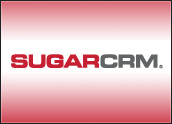
The mumbling and fiddling with equipment as SugarCRM prepared to brief analysts and the media in the Napa events room at the Palace Hotel in San Francisco on Monday pretty much set the tone for things to come.
The Windows XP laptop shut down during the setup. “Why do we buy crappy XP boxes?” growled SugarCRM CEO Larry Augustin.
Things finally settled down, and Augustin gave the small audience of analysts and reporters an overview of SugarCRM’s activities, followed by a product road map and deep dive held by cofounder and chief technology officer Clint Oram.
Go Back, Jack – Do It Again
Oram’s deep dive wasn’t; it consisted mainly of repeating points Augustin and Nick Halsey, chief marketing executive and EVP of corporate development at SugarCRM, had brought up earlier.
“Today, Sugar supports 15 languages. We’re adding seven to support 22, and adding support for right-to-left as a user interface because of customers in Israel asking for Hebrew,” Oram said, echoing Augustin’s earlier statement on this issue.
Oram said the company had added a “variety of new capabilities around Activity Streams in Sugar, specifically collaborating inside of Sugar, adding pictures and things like that.”
Earlier, Augustin had mentioned that “Sugar Feeds” had been renamed “Activity Streams,” and said it was “the emerging standard for the ability to share information moving through social platforms like Facebook and Twitter. It’s also the concept of sharing that information in the organization.”
Oram then talked about SugarCRM having added capabilities around scheduling meetings with integrations to GoToMeeting, LotusLive and WebEx in the Sugar 6 Spring 2011 release. “All this kicked off over the past year here,” he said.
OK — but the Sugar Spring 6 2011 release is out there already. It’s “about CRM made global, CRM made mobile, CRM made social, and Sugar as a platform through a set of enhancements that enable developers and VARs and the ecosystem to build better apps on Sugar,” Halsey had said previously.
Being Open Means Tomorrow’s a Blur
Perhaps SugarCRM’s vagueness about its road map is a consequence of its adhering to an open model.
“We don’t always know where the industry will be going,” Augustin said. “This is a big part of the open model around giving people control.”
The upside is an improved ability to go with the flow.
“Building CRM in a different way — CRM that’s flexible and can evolve with the industry — comes from an open collaborative process of building,” Augustin suggested. “Whatever comes up next, we want to leverage that, and we think the open model puts us in the best place to do that.”
SugarCRM will continue to adhere to its open collaborative style of development where it works with its customers and partners to develop its products, Augustin told his audience.
The company’s VARs, channel partners and customers have full access to its source code, Augustin remarked. This is not “just a dump of source code,” but rather the full development tree, he added.
“This is an ecosystem play for them,” Joshua Greenbaum, principal at Enterprise Applications Consulting, told CRM Buyer. “Success is defined by the breadth of their ecosystem; otherwise, I don’t see how a company of this size will make it.”
On SugarCRM’s Horizon
It was possible to glean some idea of the company’s direction, even if the route markers weren’t always clearly placed.
The company made enhancements in four areas in the Sugar 6 Spring 2011 release: CRM made global, CRM made mobile, CRM made social, and Sugar as a platform.
SugarCRM will also work more on integration with IBM’s Lotus family of products. Its acquisition of iExtensions could move its Lotus integration road map up by almost a year, said Nick Halsey, chief marketing executive and EVP of corporate development at SugarCRM.
“We are planning to do more with IBM in the technology road map in the months ahead,” said Oram, including “more integration with Lotus Notes.”
On the social side, SugarCRM has integrated Google Docs, Cisco WebEx Meeting Center, Twitter and Citrix Online GoToMeeting into its product, as part of its move into social CRM. The company will integrate Facebook into its product and will add other social products later, Oram remarked.
“We think the social model is changing the way we think about CRM,” Halsey said. “The customer needs to be at the center of the social experience — not your own company.”
Mobile will be another key area for SugarCRM. It now has apps running on the BlackBerry, iPad, on Android, and on the iPhone, noted Augustin. It has also incorporated offline data sync and support for HTML 5 into its product.
SugarCRM is in the process of kicking off training and certification programs for its partners.
The company holds developer sprints during which devs from its partners work side by side with its own engineering teams for a few days to build apps. During these sprints, it trains partners’ devs on its coding standards “so that every piece of code they write have the appropriate unit and functional testing written in with it,” Augustin said. “They’re getting trained on our QA practices, as well as our coding standards.”























































